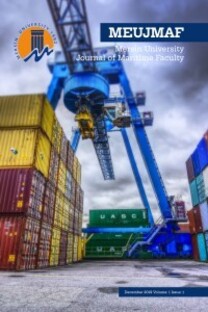A LONGITUDINAL STUDY ON KNOWLEDGE, SKILLS AND ATTITUDES OF NEWLY GRADUATED MARINE ENGINEERS
A LONGITUDINAL STUDY ON KNOWLEDGE, SKILLS AND ATTITUDES OF NEWLY GRADUATED MARINE ENGINEERS
According to the Organisation for Economic Co-operation and Development (OECD, 2023), maritime transportation, which accounts for approximately 90% of international trade, is the primary mode of transportation for global trade. In order to meet the diverse and essential needs of people around the world (such as oil, food, flour, electronics, textiles, etc.), world maritime trade must continue uninterrupted and without interruption. This continuity is ensured through thousands of ships with various characteristics that are constantly in motion on the world's seas. Marine engineers responsible for the operation, maintenance, upkeep, and repairs of the electrical generation systems, boiler systems, propulsion systems, and the operations of these systems, as well as the ability to make quick and accurate judgments during potential failures in the engine room while the ship is underway, are among the most important actors involved in this mobility. This study aims to examine the knowledge, skills, and attitudes of newly graduated marine engineers and determine whether these attributes have changed within a 15-year period. To achieve this goal, the data collection form (questionnaire) used in the author's master's thesis published in 2008 was revised and data was collected through face-to-face interviews with 33 experts who possess similar qualifications. The data obtained in 2023 and the data obtained from the master's thesis published in 2008 were analyzed using the SPSS 15.0 program, and the findings were compared longitudinally. As a result of the study, it was determined that the averages of the knowledge, skills, and attitudes possessed by newly graduated marine engineers have increased by 0.52% over a 15-year period.
___
- Barnes, S. J. (2020). Information Management Research and Practice in the post- COVID-19 World.International Journal of Information Management, 55, 102175.
- Basak, S.K. A framework on the factors affecting to implement maritime education and training system in educational institutions: A review of the literature. Procedia Eng. 2017, 194, 345–350.
- Bureau of Labor Statistics. "Marine Engineers and Naval Architects." Occupational Outlook Handbook, 2021-22 Edition. https://www.bls.gov/ooh/architecture-and-engineering/marine-engineers-and-naval-architects.html , 1.4.2023
- https://www.ics-shipping.org/publication/annualreview-2020/, 9.4.2023
- https://www.pirireis.edu.tr/turkiyede-denizcilik-egitimi-ve-piri-reis-universitesi 9.4.2023
- Internaitonal Chamber of Shipping. Heroes at Sea. 2020
- International Convention on Standards of Training, Certification and Watchkeeping for Seafarers, (STCW) 1978, as amended in 1995/2010. https://www.imo.org/en/OurWork/HumanElement/Pages/STCW-ConvLINK.aspx , 31.3.2023
- Manuel, M. E. (2017). Vocational and academic approaches to maritime education and training (MET): Trends, challenges and opportunities. WMU Journal of Maritime Affairs, 16, 473-483.
- Nuran, M., (2008). Gemi Makineleri İşletme Mühendisliğinde Aktif Eğitim Uygulamaları. Yayınlanmamış Yüksek Lisans Tezi. Dokuz Eylül Üniversitesi Sosyal Bilimler Enstitüsü. İzmir.
- OECD, (2023). Ocean Shipping and Shipbuilding. Organisation for Economic Co-operation and Development, https://www.oecd.org/ocean/topics/oceanshipping/#:~:text=The%20main%20transport%20mode%20for,can%20create%20economic%20value%20added., 03.02.2023.
- Özispa, N., & Arabelen, G., (2022). Virtual Reality in Marketing Literature: Review and Theory. International Research in Social, Human and Administrative Sciences IX. Eğitim Yayınevi, İstanbul, Türkiye.
- Şakiroğlu ,A. (2007) Uzak Yol Zabitlerinin Kariyer Planlama Ölçütleri Üzerine Bir Analiz, Dokuz Eylül Üniversitesi, Tezsiz Yüksek Lisans Projesi, İzmir
- Sokolovskaya, I. E. (2020). Socio-Psychological Factors of Students Satisfaction in the Context of Digitalization of Education During the COVID-19 Pandemic and Self-Isolation. Digital Sociology, 3(2), 46-54.
- Vervoort, M., Maes, W., & Cools, T. (2010). Implementation of project-based learning approach in marine engineering. In ICERI2010 Proceedings (pp. 2973-2981)
- www.deu.edu.tr, (2023). Gemi Makineleri İşletme Mühendisliği Bölümü Özgörevi, Eğitim Amaçları ve Çıktıları. Dokuz Eylül Üniversitesi Denizcilik Fakültesi. https://denizcilik.deu.edu.tr/gemi-makineleri-isletme-muhendisligi-bolumu-ozgorevi-egitim-amaclari-ve-ciktilari/. 13.02.2023.
- Yayın Aralığı: Yılda 2 Sayı
- Başlangıç: 2019
- Yayıncı: Mersin Üniversitesi
